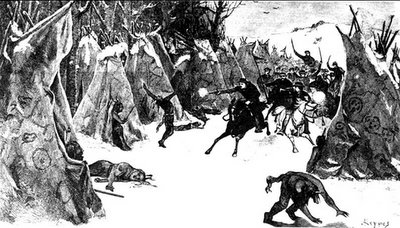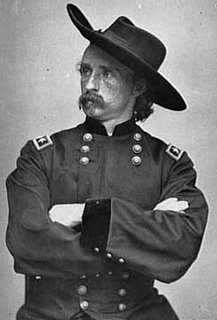Northern Valley Beacon
Information, observations, and analysis from the James River valley on the Northern Plains----- E-Mail: Enter 'Beacon' in subject box. Send to: Minnekota@Referencedesk.orgTuesday, January 17, 2006
A state park named after a pussy
Custer, left, and his troops at the massacre at Washita, right.


Some folks in South Dakota are getting a bit exercised because some Native Americans think the name of Custer State Park should be changed to Crazy Horse State Park.
From the Native American standpoint, their irritation is understandable. Custer led the incursions into the Black Hills and helped to break the treaties that the U.S. Army was supposed to uphold. He also commanded assaults against women and children in Native American villages. To the Indians, the portrayal of Custer as the big, heroic Indian fighter is an insult to the people. A stupid insult, but an insult nevertheless.
Custer is celebrated and revered by re-enactment groups who see him as a military hero. However, the military does not see him that way. When his career and battle tactics are reviewed by military scholars, he comes off as a vainglorious fool. In military parlance, the term "Custer" is a pejorative. His ego and his incompetence are what got him and his troops killed at the Little Big Horn.
An example of that is in the film "We Were Soldiers," starring Mel Gibson. First of all, many people who saw the film did not grasp the point. The film deals with one of the first major battles against the North Vietnamese in mid-November 1965. Lt. Col. Hal Moore leads the First Battalion of the Seventh Cavalry, Custer's unit, into an assault. About 450 men led by Moore soon realize they are surrounded by about 4,000 well-emplaced and well-trained Peoples Army of Viet Nam troops.
The point of the film is how bravely the Americans fought and how they looked out for each other, despite the fact that they were sent into a battle that had little justification. In the 234 Americans were killed and 242 were wounded. The casualties for the PAVN were 1,037 dead and an estimated 1,365 wounded.
Fully aware that he is in the same unit that Custer commanded, Lt.Col. Moore turns to Sergeant Major Basil Plumley and says, "I wonder what was going through Custer's mind when he realized that he'd led his men into a slaughter."
Sgt. Maj. Plumley replies: "Sir, Custer was a pussy. You ain't."
This is how the military sees Custer. He disobeyed orders. He ignored the information from his scouts. He served his ego, not his men or his mission. And at the Little Big Horn, he violated every principle of military tactic.
Custer is, in fact, held up as precisely what a good commander should not be.
While some folks object to Custer's name on a town or a state park, others see it as a reminder of the foolery and incompetence that has shaped our Indian policy and our history. We can enjoy the beautiful southern Black Hills and snicker a lot at recalling one of the biggest fools in American military history and hope that a fiasco like the Little Big Horn will never happen again. And then, we can marvel that another vainglorious fool led more than 2,200 of our soldiers to their slaughter in Iraq. Custer's foolery accounts for only 200. We don't learn much over the years. We have a state park to remind us.

A soldier from the Seventh Cavalry at the Valley of Death, Ia Drang Valley, in Viet Nam in 1965. He and 233 comrades were killed. Custer led 200 to their deaths at the Little Big Horn.


Some folks in South Dakota are getting a bit exercised because some Native Americans think the name of Custer State Park should be changed to Crazy Horse State Park.
From the Native American standpoint, their irritation is understandable. Custer led the incursions into the Black Hills and helped to break the treaties that the U.S. Army was supposed to uphold. He also commanded assaults against women and children in Native American villages. To the Indians, the portrayal of Custer as the big, heroic Indian fighter is an insult to the people. A stupid insult, but an insult nevertheless.
Custer is celebrated and revered by re-enactment groups who see him as a military hero. However, the military does not see him that way. When his career and battle tactics are reviewed by military scholars, he comes off as a vainglorious fool. In military parlance, the term "Custer" is a pejorative. His ego and his incompetence are what got him and his troops killed at the Little Big Horn.
An example of that is in the film "We Were Soldiers," starring Mel Gibson. First of all, many people who saw the film did not grasp the point. The film deals with one of the first major battles against the North Vietnamese in mid-November 1965. Lt. Col. Hal Moore leads the First Battalion of the Seventh Cavalry, Custer's unit, into an assault. About 450 men led by Moore soon realize they are surrounded by about 4,000 well-emplaced and well-trained Peoples Army of Viet Nam troops.
The point of the film is how bravely the Americans fought and how they looked out for each other, despite the fact that they were sent into a battle that had little justification. In the 234 Americans were killed and 242 were wounded. The casualties for the PAVN were 1,037 dead and an estimated 1,365 wounded.
Fully aware that he is in the same unit that Custer commanded, Lt.Col. Moore turns to Sergeant Major Basil Plumley and says, "I wonder what was going through Custer's mind when he realized that he'd led his men into a slaughter."
Sgt. Maj. Plumley replies: "Sir, Custer was a pussy. You ain't."
This is how the military sees Custer. He disobeyed orders. He ignored the information from his scouts. He served his ego, not his men or his mission. And at the Little Big Horn, he violated every principle of military tactic.
Custer is, in fact, held up as precisely what a good commander should not be.
While some folks object to Custer's name on a town or a state park, others see it as a reminder of the foolery and incompetence that has shaped our Indian policy and our history. We can enjoy the beautiful southern Black Hills and snicker a lot at recalling one of the biggest fools in American military history and hope that a fiasco like the Little Big Horn will never happen again. And then, we can marvel that another vainglorious fool led more than 2,200 of our soldiers to their slaughter in Iraq. Custer's foolery accounts for only 200. We don't learn much over the years. We have a state park to remind us.

A soldier from the Seventh Cavalry at the Valley of Death, Ia Drang Valley, in Viet Nam in 1965. He and 233 comrades were killed. Custer led 200 to their deaths at the Little Big Horn.
Archives
May 2005 June 2005 July 2005 August 2005 September 2005 October 2005 November 2005 December 2005 January 2006 February 2006 March 2006 April 2006 May 2006 June 2006 July 2006 August 2006 September 2006 October 2006 November 2006 December 2006